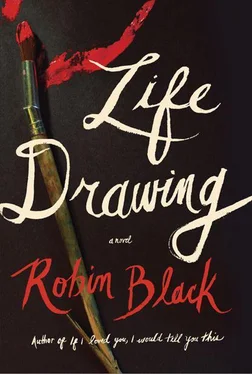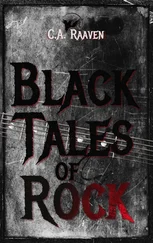There was a pause before she answered. “It’s interesting. I mean, I don’t exactly get it, but it’s this house, obviously. Right?”
“That’s right.”
“Huh.” She looked around a little more. “I’m … I like them. The details are just insanely good. But I don’t really understand. They’re soldiers from long ago, right? I just … I don’t think of you as someone with that kind of … I guess I feel like I’m missing something here. And I don’t really think of you doing, I don’t know, antiwar art. Is it? I mean, that would be cool, but …”
As she spoke I realized that something had been nagging at me for weeks. How much were the paintings dependent on the story behind them? Did they stand alone or did they need me beside them explaining about the house and the bathroom rehab and the wall?
“Why antiwar?” I asked. “What makes you think it’s anything critical like that?”
“Because they’re dead, Augie. Aren’t they? The boys are all dead.”
Over the next half hour, I forgot about Owen and Bill, both evaporating as I explained to Laine that she wasn’t wrong, but that she also was wrong — or maybe I was. I told her the story of the bathroom and the papers. I showed her a couple of the obituaries. “But I don’t want them to look dead in the paintings,” I said. “That isn’t intentional. That’s … well, like I said. Not intentional.”
“Huh.” She looked concerned. “It’s really interesting work, Augie,” she repeated. “And if people take it as antiwar or whatever, that’s not a bad thing, is it? I mean, God, we’ve been at war most of my life. And there are kids I know who barely even know it. All these rich kids who are like, oh right, we’re still at war. And I really like that they’re from some other time. It’s like this brings home how permanent death is. I mean, I look at them and all I see is how sick it is that they were killed so young.”
But it wasn’t what I wanted; and she saw my distress. “I’m not saying it’s simplistic or anything. Guernica is an antiwar piece and there’s nothing simple about Guernica . Not to mention a million other works.”
“I’ve been … I’ve been working on them,” I said. “Trying. The thing is, I don’t mean them to be like this. Dead. I mean, I want them to be alive. To seem alive. That’s actually kind of the point. To integrate the dead into life. But you can say it, Laine. It’s okay. I know you’re being polite because I’m your teacher. But what would you say if I were one of the poser hipster wannabes?”
“Well.” She bit on her lower lip, then nodded. Inhaled deeply. Exhaled. “Okay. I’d probably say you needed to take a life-drawing class. Except I’d find a snarkier way to put it.”
I laughed. “There, that wasn’t so hard, was it?”
She shrugged. “It wasn’t exactly easy. But you know, you’re the one who told me that it was okay to do bad work sometimes. I can’t even count the number of times you told me if I couldn’t tolerate making mistakes, I would never get better. If you can’t paint the bad stuff, you’ll never paint the good stuff. I never really thought about that applying to you, but it does, right? I mean, it’s always true, isn’t it?”
She was right, of course. Both that I had said it, and that it was true for us all. But I had grown more cautious since my days of preaching the virtues of risk and of failure to Laine. Mistakes had lost their appeal to me.
“I’m not sure this is something I can learn,” I said. “Portraiture. I’m not sure this isn’t more … something basic about me. I may just not have the life-drawing gene. Whatever it takes to make a thing look alive.”
“Augie, you make everything look alive. Look at every brick you’ve ever painted. Every chair. I don’t even know what you mean.”
“Every thing . Not every one .”
“You should just paint them, Augie. Keep going. Just paint them the way you imagine them.”
I thought about that. “That may be part of the problem too. I don’t paint from my imagination. I never have. You know that. I paint what I see. That’s always been the point.”
“Yeah. I know. But then why are you doing this?”
I didn’t answer. There was no answer that wasn’t better suited to a therapist. Or a husband.
“I say just go for it, Augie. And if you fail, then you fail, right? What’s the big deal? Obviously, your instincts or whatever are telling you to do this. It’s new ground for you. It’s exciting, right? Like when I did those collages and they sucked so unbelievably, but then when I went back to painting, something had changed. In a good way.” She looked at her wide black leather watch. “Shit,” she said. “I really have to go. Seriously, I cannot be a minute late. Mom’s been a little wacky lately. Turning fifty maybe, and then Dad’s whole upcoming wedding thing. She never says it bothers her, but she’s been a wreck ever since she found out. They ‘stayed friends,’ you know.” The term came in giant air quotes. “I don’t think she fully understood about being divorced. Until he and Miriam …”
“You shouldn’t make her wait. Come on, let’s get you on the road.”
But she paused in the studio door. “I feel like I’ve let you down,” she said. “Like I said the wrong thing. I don’t want to just rush off …”
“No.” I shook my head. “You said the right thing. The exact right thing. And the only way you could have let me down is by lying to me about this. I needed to hear it.” I laughed a little. “I’m not saying I know how to respond. But I needed to hear the truth.”
Outside, we ran smack into Alison, heading toward my house. Introducing them, I was aware of being in Owen’s line of vision should he be near his window.
Alison was friendly and told Laine she’d heard wonderful things about her. Laine seemed excited to meet Alison, the cheery British neighbor who had finally broken through the fortifications of Augie’s hideaway.
“I’ll leave you two to say goodbye,” Alison said after a few exchanges. “So nice to meet.”
“You were coming over …?” I asked.
“I was,” she said. “But it can wait. Maybe stop by in a bit?”
I told her I would.
As Laine and I hugged goodbye, I said, “Thank you for all that,” and she said, “I really hope you do it, Augie. You have to finish them. Just play. Don’t even think of it as work.” Then, “Love you!” when she got into the car.
I waved as she drove away.
“Love you, too,” I said, as her car disappeared from sight.
Iwent for a short walk after that, by myself. Down the driveway and about half a mile on the road. I had more to process than just Laine’s painting advice — and I wanted to think it through in solitude, before the scene with Owen that I knew was bound to come.
It had been Laine’s description of Georgia, of how Bill’s marriage had hit her so hard, that had startled me. Listening, I had expected it to be like a mirror held up to my own bruised heart, my own bruised ego, the image revealing the fragility of the truce I’d forged with those aspects of myself. After all, I too was the jilted woman, still mourning her lost love. After all, the last real mirror I had looked in had been filled with concerns about what Bill would hear about my appearance, my own face fused with imaginings of his.
But something had shifted. Just in the past hour. Or maybe it was a shift already in the works, just waiting for the right circumstance to be complete.
Laine.
Before there was Bill, before we were lovers, there was Laine. A messed-up, angry girl with talent, who needed me. Before her father and I found each other, she and I already had. Before there was danger, there had been nurturing. Caring. A kind of mutual recognition that can only be called love.
Читать дальше












